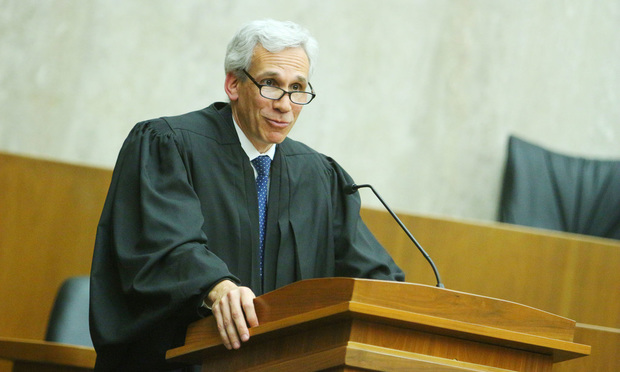'Is That Really What the Framers Had in Mind?' DOJ Faces Skeptical Judge in House Subpoena Fight
"If you think impeachment is the answer here, that really is not a good state of affairs for our country," U.S. District Judge Randolph Moss in Washington said at a hearing Thursday in a dispute over access to census documents.
January 30, 2020 at 04:22 PM
6 minute read
The original version of this story was published on National Law Journal
 Judge Randolph Moss. Photo: Diego M. Radzinschi/ALM.
Judge Randolph Moss. Photo: Diego M. Radzinschi/ALM.
A federal judge in Washington pushed back Thursday against the Trump administration's argument that courts lack authority to resolve disputes between Congress and the executive branch, questioning the Justice Department's assertion that the House should use "political tools" rather than lawsuits to enforce subpoenas seeking records and testimony.
As President Donald Trump's impeachment proceeded just blocks away in the Senate, U.S. District Judge Randolph Moss of the District of Columbia appeared struck by the Justice Department's claim that the court should play no role in the House's pursuit of records related to the administration's now-abandoned bid to include a question about citizenship status on the 2020 census. Trump's impeachment lawyers have insisted the courts do have a role.
On Thursday, echoing arguments from other recent cases over House oversight requests, Justice Department attorney James Burnham said the separation of powers outlined in the Constitution gave the courts no jurisdiction in the standoff over the census records. Rather than file lawsuits, Burnham said, the House could leverage its legislative and appropriations authority—even the power of impeachment—to pressure the administration to provide records.
"Is that really what the Framers had in mind?" Moss asked.
"If you think impeachment is the answer here," the judge added, "that really is not a good state of affairs for our country."
The argument played out against the backdrop of Trump's impeachment trial, where the president's lawyers have appeared to contradict the Justice Department's claim that Congress can never go to court against the executive branch.
 Chairman Adam Schiff (D-CA) on Nov. 19, 2019. Photo: Diego M. Radzinschi / ALM
Chairman Adam Schiff (D-CA) on Nov. 19, 2019. Photo: Diego M. Radzinschi / ALMIn the Senate trial, Burnham's argument quickly drew a reaction from U.S. Rep. Adam Schiff, one of the House managers arguing for Trump's conviction.
Schiff, who leads the impeachment inquiry as chairman of the House Intelligence Committee, drew laughter at the start of his remarks when he stated "you can't make this stuff up." The California Democrat noted DOJ has faced questions about how its stance in court appears contradictory to the arguments Trump's lawyers are making at the impeachment trial.
"I didn't think they'd make it on the same day," Schiff said.
During Thursday's arguments in court, House lawyer Megan Barbero noted the apparent contradiction, saying that Trump's defense team at his impeachment proceedings has argued that Democrats should have gone to court to obtain more evidence before accusing him of abuse of power and obstruction of Congress.
Burnham disputed that Trump's impeachment lawyers had contradicted the Justice Department's arguments. Moss at one point suggested that Trump and the House were each trying to have it both ways: the House wanting to impeach Trump and go to court against the administration, while Trump seeks to avoid a conviction at his Senate trial and his Justice Department pushes to keep Congress from suing over subpoenas.
"We are hypocrites, and they are hypocrites, I guess," Burnham joked.
For Burnham, Thursday's argument marked the end of his year-long tenure as the head of the federal programs branch of the Justice Department's civil division, a visible litigation role requiring frequent court appearances in defense of the administration. Burnham is stepping down from that role to become an adviser to Attorney General William Barr and is set to begin clerking for Justice Neil Gorsuch on the U.S. Supreme Court later this year.
Sipping a Diet Coke throughout the three-hour hearing, Moss pressed Burnham about his broad claim that the House cannot go to court against the administration. Burnham said it would mark a "revolutionary change in the relationship between the branches" if the House could turn to the courts to resolve oversight disputes.
"These cases will multiply like rabbits," Burnham said, drawing a laugh from House general counsel Douglas Letter.
 Douglas Letter, general counsel to the U.S. House of Representatives. Photo: Jason Doiy/ALM
Douglas Letter, general counsel to the U.S. House of Representatives. Photo: Jason Doiy/ALMMoss said he was "still puzzling through the issue" of the House's ability to take the executive branch to court but suggested that judges should be able to step into interbranch disputes as a "last resort." Still, he said it is best for courts to "stay out of those disputes" and allow Congress and executive branch to resolve standoffs on their own.
Earlier in the hearing, House lawyer Adam Grogg argued that lawmakers needed records from the Justice Department and Commerce Department to "protect the 2020 census and future censuses," saying the citizenship question threatened to compromise the accuracy of the decennial survey. In July, the House voted to hold Barr and Commerce Secretary Wilbur Ross in contempt over their departments' refusal to turn over records related to the failed bid to include a citizenship question on the upcoming census.
House Democrats, joined by lawyers from Debevoise & Plimpton, sued for the records months later, claiming that the Trump administration was refusing to turn them over in violation of a subpoena.
"There can be no question why the committee is concerned," Grogg said Thursday, referring to the House Committee on Oversight and Reform.
Moss questioned whether the administration and Congress had, in fact, reached an impasse in negotiations over the census records and cited appeals court precedent that, he said, made it "pretty darn clear" that judges should avoid stepping into interbranch disputes.
Read more:
Roberts Rebuffs Rand Paul, Refusing to Read Impeachment Question 'As Submitted'
House Throws Ken Starr's Words Back at Trump in Tax Returns Fight
'Cannot Have It Both Ways': Doug Letter Criticizes Trump Lawyers
Meet the Big Law Litigators the US House Turned To in 2019
Debevoise Teams With House to Sue Wilbur Ross Over Census Documents
This content has been archived. It is available through our partners, LexisNexis® and Bloomberg Law.
To view this content, please continue to their sites.
Not a Lexis Subscriber?
Subscribe Now
Not a Bloomberg Law Subscriber?
Subscribe Now
NOT FOR REPRINT
© 2025 ALM Global, LLC, All Rights Reserved. Request academic re-use from www.copyright.com. All other uses, submit a request to [email protected]. For more information visit Asset & Logo Licensing.
You Might Like
View All
MoFo Associate Sees a Familiar Face During Her First Appellate Argument: Justice Breyer

Amid the Tragedy of the L.A. Fires, a Lesson on the Value of Good Neighbors

Litigators of the Week: Shortly After Name Partner Kathleen Sullivan’s Retirement, Quinn Emanuel Scores Appellate Win for Vimeo
Trending Stories
Who Got The Work
J. Brugh Lower of Gibbons has entered an appearance for industrial equipment supplier Devco Corporation in a pending trademark infringement lawsuit. The suit, accusing the defendant of selling knock-off Graco products, was filed Dec. 18 in New Jersey District Court by Rivkin Radler on behalf of Graco Inc. and Graco Minnesota. The case, assigned to U.S. District Judge Zahid N. Quraishi, is 3:24-cv-11294, Graco Inc. et al v. Devco Corporation.
Who Got The Work
Rebecca Maller-Stein and Kent A. Yalowitz of Arnold & Porter Kaye Scholer have entered their appearances for Hanaco Venture Capital and its executives, Lior Prosor and David Frankel, in a pending securities lawsuit. The action, filed on Dec. 24 in New York Southern District Court by Zell, Aron & Co. on behalf of Goldeneye Advisors, accuses the defendants of negligently and fraudulently managing the plaintiff's $1 million investment. The case, assigned to U.S. District Judge Vernon S. Broderick, is 1:24-cv-09918, Goldeneye Advisors, LLC v. Hanaco Venture Capital, Ltd. et al.
Who Got The Work
Attorneys from A&O Shearman has stepped in as defense counsel for Toronto-Dominion Bank and other defendants in a pending securities class action. The suit, filed Dec. 11 in New York Southern District Court by Bleichmar Fonti & Auld, accuses the defendants of concealing the bank's 'pervasive' deficiencies in regards to its compliance with the Bank Secrecy Act and the quality of its anti-money laundering controls. The case, assigned to U.S. District Judge Arun Subramanian, is 1:24-cv-09445, Gonzalez v. The Toronto-Dominion Bank et al.
Who Got The Work
Crown Castle International, a Pennsylvania company providing shared communications infrastructure, has turned to Luke D. Wolf of Gordon Rees Scully Mansukhani to fend off a pending breach-of-contract lawsuit. The court action, filed Nov. 25 in Michigan Eastern District Court by Hooper Hathaway PC on behalf of The Town Residences LLC, accuses Crown Castle of failing to transfer approximately $30,000 in utility payments from T-Mobile in breach of a roof-top lease and assignment agreement. The case, assigned to U.S. District Judge Susan K. Declercq, is 2:24-cv-13131, The Town Residences LLC v. T-Mobile US, Inc. et al.
Who Got The Work
Wilfred P. Coronato and Daniel M. Schwartz of McCarter & English have stepped in as defense counsel to Electrolux Home Products Inc. in a pending product liability lawsuit. The court action, filed Nov. 26 in New York Eastern District Court by Poulos Lopiccolo PC and Nagel Rice LLP on behalf of David Stern, alleges that the defendant's refrigerators’ drawers and shelving repeatedly break and fall apart within months after purchase. The case, assigned to U.S. District Judge Joan M. Azrack, is 2:24-cv-08204, Stern v. Electrolux Home Products, Inc.
Featured Firms
Law Offices of Gary Martin Hays & Associates, P.C.
(470) 294-1674
Law Offices of Mark E. Salomone
(857) 444-6468
Smith & Hassler
(713) 739-1250







